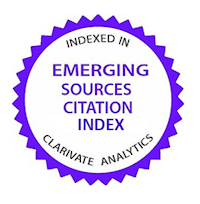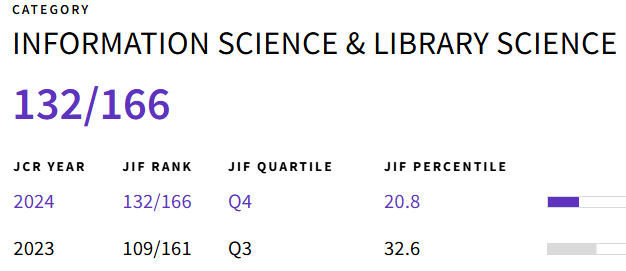Threading metaliteracy into translation and interpreting undergraduates’ information literacy training: A reflective active learning approach
Abstract
Information competence is an essential component of translation competence and the basis for the lifelong learning of Translation and Interpreting trainees. This work describes the author’s updated approach to an information literacy course for Translation and Interpreting undergraduate students implemented at the Universitat Jaume I (Spain), which, due to the health situation generated by the COVID-19 pandemic, had to be taught entirely online. The article gives an account of how metaliteracy has been integrated as a guiding thread to encourage reflection and critical thinking throughout the course and awareness of its importance. The students’ feedback and the assessment results demonstrate that learning has been significant. Hopefully, the perspective, curricular proposal and experience analyzed here could be transferable to other discipline-based information literacy training programs.
Downloads
Metrics
-
Abstract1318
-
PDF1146
References
ALBL-MIKASA, M. Developing and cultivating expert interpreter competence. The Interpreters’ Newsletter, 2013, n. 18, p. 17-34. Available at: https://doi.org/10.21256/zhaw-4081.
ACRL/ALA. Framework for Information Literacy for Higher Education. 2015. Available at: http://www.ala.org/acrl/standards/ilframework. Revision of the Spanish translation: SALES, D. Marco de referencia para la alfabetización informacional en la educación superior, 2019. Available at: http://dx.doi.org/10.6035/2019.MarcoAlfabetizacion.
ÁREA, M. and PESSOA, T. De lo sólido a lo líquido: Las nuevas alfabetizaciones ante los cambios culturales de la Web 2.0. Comunicar, 2012, n. 38, p. 13-20. Available at: https://doi.org/10.3916/C38-2011-02-01.
BADKE, W.E. The Horizon Report and information literacy. Online Searcher, 2019, vol. 43, n. 3, p. 55-57.
BEDI, S. and WEBB, J. Visual Research Methods. An Introduction for Library and Information Studies. London: Facet, 2020.
BRAME, C.J. Active Learning. 2016. Vanderbilt University Center for Teaching. Available at: https://cft.vanderbilt.edu/guides-sub-pages/active-learning/ [Consulted: 3 December 2021]
BRUCE, C.; EDWARDS, S. and LUPTON, M. Six frames for information literacy education: A conceptual framework for interpreting the relationships between theory and practice. Innovation in Teaching and Learning in Information and Computer Sciences, 2006, vol. 5, n. 1, p. 1-18. Available at: https://doi.org/10.11120/ital.2006.05010002.
BULL, A.C.; MacMILLAN, M. and HEAD, A. Dismantling the evaluation framework. 2021. In The Library With The Lead Pipe. Available at: https://www.inthelibrarywiththeleadpipe.org/2021/dismantling-evaluation/#footnote_2_10440 [Consulted: 3 December 2021]
CILIP Information Literacy Group. CILIP Definition of Information Literacy, 2018. https://infolit.org.uk/new-il-definition/ Spanish translation: SALES, D. Definición de alfabetización informacional de CILIP, 2018. Anales de Documentación, 2020, vol. 23, n. 1. Available at: https://doi.org/10.6018/analesdoc.373811.
ELMBORG, J. Critical information literacy: implications for instructional practice. The Journal of Academic Librarianship, 2006, vol. 32, n. 2, p. 192-199.
FISTER, B. Lizard people in the libraries. PIL Provocation Series, 2021, vol. 1, n. 1. Project Information Literacy Research Institute. Available at: https://projectinfolit.org/pubs/provocation-series/essays/lizard-people-in-the-library.html [Consulted: 3 December 2021]
GONZÁLEZ-DAVIES, M. and ENRÍQUEZ-RAÍDO, V. Situated learning in translator and interpreter training: Bridging research and good practice. The Interpreter and Translator Trainer, 2016, vol. 10, n. 1, p. 1-11. Available at: https://doi.org/10.1080/1750399X.2016.1154339.
GOLDSTEIN, S. Informed Societies: Why Information Literacy Matters for Citizenship, Participation and Democracy. London: Facet, 2020.
GOUGH, J. Developing translation-oriented research competence: What can we learn from professional translators? The Interpreter and Translator Trainer, 2019, vol. 13, n. 3, p. 342-359. Available at: https://doi.org/10.1080/1750399X.2019.1656404.
GRAFSTEIN, A. A discipline-based approach to information literacy. The Journal of Academic Librarianship, 2002, vol. 28, n. 4, p. 197-204. Available at: http://doi.org/10.1016/S0099-1333(02)00283-5.
HARRIS, B.R. Communities as necessity in information literacy development: Challenging the standards. The Journal of Academic Librarianship, 2008, vol. 34, n. 3, p. 248-255. Available at: https://doi.org/10.1016/j.acalib.2008.03.008.
HEAD, A.J. Reading in the age of distrust. PIL Provocation Series, 2021, vol. 1, n. 2. Project Information Literacy Research Institute. Available at: https://projectinfolit.org/pubs/provocation-series/essays/reading-in-the-age-of-distrust.html [Consulted: 3 December 2021]
HICKS, A. and LLOYD, A. Seeing information: Visual methods as entry points to information practices. Journal of Librarianship and Information Science, 2018, vol. 50, n. 3, p. 229-238. Available at: https://doi.org/10.1177/0961000618769973.
HICKS, A. and LLOYD, A. Deconstructing information literacy discourse: Peeling back the layers in higher education. Journal of Librarianship and Information Science, 2020. Online First. Available at: https://doi.org/10.1177/0961000620966027.
HICKS, A. and SINKINSON, C. Participation and presence: Interrogating active learning. portal: Libraries and the Academy, 2021, vol. 21, n.4, p. 749-771. Available at: https://muse.jhu.edu/article/818427 [Consulted: 3 December 2021]
HILL, V.J. and MACKEY, T.P. Embracing metaliteracy. Metamodern libraries and virtual learning communities. C&RL News, 2021, vol. 82, n. 5, p. 219-222. Available at: https://doi.org/10.5860/crln.82.5.219.
HURTADO ALBIR, A. Traducción y traductología. Introducción a la traductología. Madrid: Cátedra, 2001.
HURTADO ALBIR, A. (ed). Researching Translation Competence by PACTE Group. Amsterdam: John Benjamins, 2017.
HURTADO ALBIR, A. et al. Establecimiento de niveles de competencias en traducción. Primeros resultados del proyecto NACT. Onomázein. Revista de lingüística, filología y traducción, 2019, n. 43, p. 1-25. Available at: 10.7764/onomazein.43.08.
JACOBSON, T.E. and MACKEY, T.P. Proposing a metaliteracy model to redefine. Information Literacy. Communications in Information Literacy, 2013, v. 7, n. 2, p. 84-91. Available at: https://doi.org/10.15760/comminfolit.2013.7.2.138.
JACOBSON, T.E. and MACKEY, T.P. Metaliteracy in Practice. London: Facet, 2016.
JACOBSON, T.; MACKEY, T.; O’BRIEN, K.; FORTE, M. and O’KEEFFE, E. Metaliteracy Goals and Learning Objectives, 2018. Available at: https://metaliteracy.org/learning-objectives/2018-metaliteracy-goals-and-learning-objectives/ Spanish translation: SALES, D. Metas y Objetivos de Aprendizaje de la Meta-alfabetización, 2020. Available at: https://metaliteracy.org/learning-objectives/goals-and-learning-objectives-translated/metas-y-objetivos-de-aprendizaje-de-la-meta-alfabetizacion/ [Consulted: 3 December 2021]
JACOBSON, T.E. and FRIEDMAN, S. Teaching critical thinking and metaliteracy through OER: Theory and practice in a course collaboration. The International Journal of Open Educational Resources, 2020, vol. 2, n. 1, p. 173-189. Available at: https://www.ijoer.org/teaching-critical-thinking-and-metaliteracy-through-oer-theory-and-practice-in-a-course-collaboration-doi10-18278-ijoer-2-1-11/ [Consulted: 3 December 2021]
KALINA, S. Preparation. In PÖCHHACKER, F. (ed.). Routledge Encyclopedia of Interpreting Studies. London: Routledge, 2015, p. 318-320.
KAPUR, M. The Necklace. In SINGH, K. (ed.). The HarperCollins Book of New Indian Fiction. Contemporary Writing in English. New Delhi: HarperCollins, 2005, p. 73-77.
KELLY, D. A Handbook for Translator Trainers. A Guide to Reflective Practice. Manchester: St. Jerome, 2005.
LLOYD, A. No man (or woman) is an island: Information literacy, affordances and communities of practice. Australian Library Journal, 2005a, vol. 54, n. 3, p. 230-237. Available at: https://doi.org/10.1080/00049670.2005.10721760.
LLOYD, A. Information literacy: Different contexts, different concepts, different truths? Journal of Librarianship and Information Science, 2005b, vol. 37, n. 2, p. 82-88. Available at: https://doi.org/10.1177/0961000605055355.
LLOYD, A. Information Literacy Landscapes: Information Literacy in Education, Workplace and Everyday Contexts. Oxford: Chandos, 2010.
LLOYD, A. Chasing Frankenstein’s monster: Information literacy in the black box society. Journal of Documentation, 2019, vol. 75, n. 6, p. 1475-1485. Available at: https://doi.org/10.1108.
MACKEY, T.P. and JACOBSON, T.E. Reframing information literacy as a metaliteracy. College & Research Libraries, 2011, vol. 72, n. 1, p. 62-78. Available at: https://doi.org/10.5860/crl-76r1.
MACKEY, T.P. and JACOBSON, T.E. Metaliteracy: Reinventing Information Literacy to Empower Learners. Chicago: ALA Neal-Schuman, 2014.
MACKEY, T.P. Embedding metaliteracy in the design of a post-truth MOOC: Building communities of trust. Communications in Information Literacy, 2020, vol. 14, n. 2, p. 346-361. Available at: https://doi.org/10.15760/comminfolit.2020.14.2.9.
MASSEY, G. and EHRENSBERGER-DOW, M. Investigating information literacy: A growing priority in translation studies. Across Languages and Cultures, 2011, vol. 12, n. 2, p. 193-211.
OLALLA-SOLER, C. Using electronic information resources to solve cultural translation problems: Differences between students and professional translators. Journal of Documentation, 2018, vol. 74, n. 6, p. 1293-1317. Available at: https://doi.org/10.1108/JD-02-2018-0033.
OWUSU-ANSAH, E.K. Information literacy and higher education: Placing the academic library in the center of a comprehensive solution. The Journal of Academic Librarianship, 2004, vol. 30, n. 1, p. 3-16.
PINTO, M. and SALES, D. A research case study for user-centred information literacy instruction: Information behaviour of translation trainees. Journal of Information Science, 2007, vol. 33, n. 5, p. 531-550. Available at: https://doi.org/10.1177/0165551506076404.
PINTO, M. and SALES, D. INFOLITRANS: A model for the development of information competence for translators. Journal of Documentation, 2008, vol. 64, n. 3, p. 413-437. Available at: https://doi.org/10.1108/00220410810867614.
SALES, D. Documentación aplicada a la traducción: Presente y futuro de una disciplina. Gijón: Trea, 2006.
SALES, D. Towards a student-centred approach to information literacy learning: A focus group study on the information behaviour of translation and interpreting students. Journal of Information Literacy, 2008, vol. 2, n. 1, p. 41-60. Available at: https://doi.org/10.11645/2.1.104.
SALES, D. and PINTO, M. The professional translator and information literacy: Perceptions and needs. Journal of Librarianship and Information Science, 2011, vol. 43, n. 4, p. 246-260. Available at: https://doi.org/10.1177/0961000611418816.
SALES, D. and PINTO, M. (eds.). Pathways into Information Literacy and Communities of Practice. Teaching Approaches and Case Studies. Oxford/Cambridge: Chandos/Elsevier, 2017.
SALES, D.; PINTO, M. and FERNÁNDEZ-RAMOS, A. Undressing information behaviour in the field of translation: A case study with translation trainees. Journal of Librarianship and Information Science, 2018, vol. 50, n. 2, p. 186-198. Available at: https://doi.org/10.1177/0961000616666131.
SALES, D.; CUEVAS-CERVERÓ, A. and GÓMEZ-HERNÁNDEZ, J.A. Perspectives on the information and digital competence of social sciences students and faculty before and during lockdown due to Covid-19. Profesional de la información, 2020, vol. 29, n. 4, e290423. Available at: https://doi.org/10.3145/epi.2020.jul.23
SECKER, J. and COONAN, E. A New Curriculum for Information Literacy (ANCIL). 2011. Cambridge: Cambridge University Library. Available at: https://openaccess.city.ac.uk/id/eprint/17370/ [Consulted: 3 December 2021]
TALJA, S. and LLOYD, A. Integrating theories of learning, literacies and information practices. In LLOYD, A. and TALJA, S. (eds.). Practising information literacy. Bringing theories of learning, practice and information literacy together. Bathurst: Centre for Information Studies, Charles Sturt University, 2010, p. 9-20.
TROWELL, C. Using the minute paper as a classroom assessment technique. Cambridge Information Literacy Network. 2020. Available at: https://camiln.org/2020/03/05/using-the-minute-paper-as-a-classroom-assessment-technique/ [Consulted: 3 December 2021]
WEBBER, S. and JOHNSTON, B. Working towards the information literate university. In WALTON, G. and POPE, A. (eds.). Information Literacy: Recognising the Need. Oxford: Chandos, 2006, p. 47-58.
WITEK, D. and GRETTANO, T. Teaching metaliteracy: A new paradigm in action. Reference Services Review, 2014, vol. 42, n. 2, p. 188-208. Available at: https://doi.org/10.1108/RSR-07-2013-0035.
ZINUKOVA, N. Acquiring translation and interpreting competences: Integrated approach. Foreign Languages, 2016, n. 2, p. 18-24. Available at: https://doi.org/10.32589/im.v0i3.122557.

This work is licensed under a Creative Commons Attribution 4.0 International License.
Las obras que se publican en esta revista están sujetas a los siguientes términos:
1. El Servicio de Publicaciones de la Universidad de Murcia (Editum) conserva los derechos patrimoniales ('copyright') de las obras publicadas, y favorece y permite la reutilización de las mismas bajo la licencia de uso.
2. Las obras se publican en la edición electrónica de la revista bajo la licencia Creative Commons Atribución Internacional CC BY 4.0. Se puede copiar y redistribuir el material en cualquier medio o formato y remezclar, transformar y crear a partir del material para cualquier finalidad, incluso comercial.






